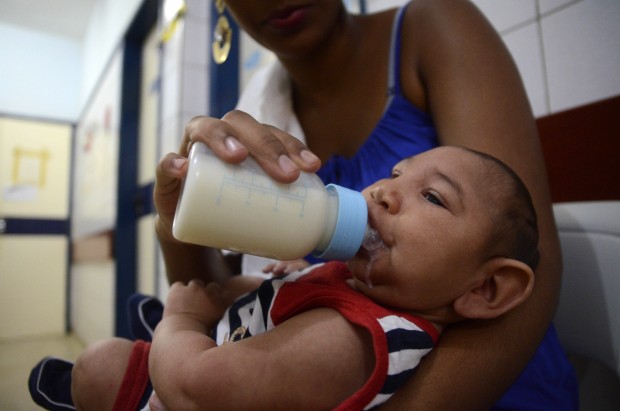Zika virus sparks fears in Korea

The recent cluster of microcephaly cases and other neurologic disorders reported in Brazil constituted a Public Health Emergency of International Concern, the World Health Organization (WHO) said Monday. The announcement came after WHO convened its first Emergency Committee meeting on Zika virus. (Xinhua/Diego Herculano/Brazil Photo Press/AGENCIA ESTADO) (vf) (sp)
The fear of the Zika virus, which is linked to the birth defect microcephaly, is growing in Korea.
Although no case has been reported here, the health authorities raised the alarm for travelers, particularly pregnant women, who plan to visit the virus-affected countries, especially the Americas.
The virus is spread through the “aedes aegypti” mosquito — responsible for dengue and yellow fever, and other tropical diseases. Pregnant women are thought to be the most vulnerable although the causality between the mosquito bite and the birth defect has not been officially confirmed.
As one infection has been reported recently in Thailand, people here worry about the possible spread of the virus to tropical Asian nations Koreans frequently travel to.
Also, the World Health Organization (WHO) warned that China and other countries with dengue fever should be concerned about Zika virus infections.
As the fear is snowballing, Internet community sites for mothers and expectant mothers here are being bombarded with questions about canceling overseas trips.
“I decided to travel to Jeju Island for my honeymoon instead of Thailand. I am pregnant so my baby’s heath is most important,” a woman posted on one of such site.
Korean Air, the nation’s largest flagship carrier, said that it exempts pregnant passengers from cancelation fees for flights to San Paulo, Brazil.
“With documents proving pregnancy, passengers are exempted from the cancellation fees due to the fear of the Zika virus in that country,” an official of the carrier, said.
Hana Tour, the nation’s largest travel agency, said that not many people have cancelled their travels to virus-affected regions.
“Koreans, especially newly-weds, rarely travel to countries in Central and South America, so there have been few cancellations,” an official at the tour agency said. “So far our company has not been hit by the virus concerns as much as MERS last year. But we worry that many people are asking us about unconfirmed information about the disease,” he said.
The Korea Centers for Disease Control and Prevention (KCDC) recommends pregnant women delay their travel to 24 countries on a watch list for the virus.
Also, travelers are advised to try and avoid being bitten by mosquitoes during trips to those countries.
“So far, the possibility of the virus spreading here is low, as no case has been reported and the mosquitoes responsible for the virus have not been found. But as people can contract the virus through travel, we are promoting preventative methods,” the KCDC said.
The Ministry of Culture, Sports and Tourism urged Korean travelers to be careful if they visit Central and South America. A large number of Koreans are expected to visit Brazil this year for the Summer Olympics in Rio de Janeiro from Aug. 5 to 21.
The ministry will give out guidelines for athletes to help prevent infection.
The World Health Organization (WHO) said that the virus will infect three to four million people over the next year.
Since last October, some 4,000 suspected cases have been reported in Brazil, with some 230 of them testing positive for the virus.
According to WHO, one out of four people do not develop symptoms; but others might have a mild fever, rash, bloodshot eyes and arthralgia which can last between two and seven days.
Most patients naturally recover after three to seven days. No vaccines or specific drugs have been developed against the virus.
(This article was originally published in The Korea Times)
























































